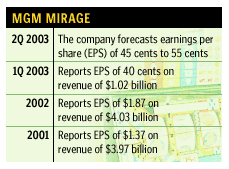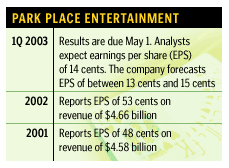NEW YORK (CNN/Money) -
Casino profits narrowly beat the odds in the first quarter, dodging bullets in the form of SARS and the war in Iraq. But hold the champagne. The still weak economy and proposed state tax hikes could yet be a problem worth betting on.
The economic slowdown has hit casino hotbeds dependent on consumers who fly into town -- such as Las Vegas -- and to a lesser extent, those whose customers live closer and drive or bus in -- such as Atlantic City.
Las Vegas, the casino industry's main artery, is the only big hub that relies on international visitors for a large chunk of its profits. Roughly 12 percent of overall revenue for the city comes from international visitors, many of whom are Asian.
Surprisingly, the war in Iraq and the scare of SARS have not made the pain much worse in the past couple of months.

Statistics from the Las Vegas Convention and Visitors Authority and the Nevada Gaming Commission show only a 4.9 percent decline in visitors and hotel bookings in February from January as preparations for war hit high speed. March figures are not yet available, but the drop seems small compared to the period after September 11, 2001, when visitor volume in Las Vegas dropped 21 percent.
"Gaming in Las Vegas has suffered more than elsewhere, because a large number of Asians travel to Las Vegas," said Naomi Greer, spokesperson for the American Gaming Association. "But the immediate impact to the broader industry has been less than was anticipated."
When contacted, spokespeople for Harrah's (HET: Research, Estimates), MGM Mirage (MGG: Research, Estimates) and Park Place Entertainment (PPE: Research, Estimates) -- the three largest casino operators in terms of market capitalization -- cited only minor weakness in the first quarter as a result of the war and SARS, the deadly pneumonia-like illness that has affected thousands of people worldwide, mostly in China, Hong Kong and Singapore.
The companies' recent earnings reports confirm this. However, they also confirm that the threat of the weak economy and proposed increases to state gaming taxes could be a big problem for business for the rest of 2003 and beyond.
State tax hikes loom
MGM reported first-quarter earnings last week that edged estimates, but warned about its current quarter. Both Harrah's and Argosy Gaming (AGY: Research, Estimates) reported first-quarter profits early Tuesday that beat estimates, but declined to give any forward-looking guidance

War and SARS didn't cut into casino attendance as much as had been anticipated, but they did magnify the impact of the sick economy. Add to that the threat of steep tax cuts currently under discussion in several state legislatures and casino earnings could lose much of their luster a few quarters down the road.
The most recent proposal, in Illinois, asks for a 20 percent "windfall" tax on casinos that generate income of more than $250 million a year, and an increase in the admission tax to $5 from $3 per visitor.
"The worst-case scenario is that if the increases go through as they are proposed, operators such as Harrah's and Mandalay Resort (MBG: Research, Estimates) could lose 4 percent of their cash flow in 2004 and 10 percent of their stock value," said UBS Warburg leisure and gaming analyst Robin Farley.
In a recent note, Merrill Lynch leisure and gaming analyst David Anders estimated that the impact to fiscal 2004 earnings per share should the proposals go through would be roughly 11 cents for Harrah's, 17 cents for Mandalay, and 13 cents for Argosy Gaming.
In its quarterly report Tuesday, Argosy Gaming said earlier tax hikes had already hurt profits and that the firm might need to cut operating hours if the Illinois proposal is approved.
Many industry experts, however, expect the proposal to be scaled back before it passes.

A tax hike proposal in Atlantic City's home state of New Jersey announced two months ago has already generated lobbying for revisions. The New Jersey fiscal year 2004 state budget calls for an increase in casino revenue taxes to 10 percent from 8 percent, a hefty 25 percent increase, but the first such move in 25 years. In addition, the plan would require casino companies to pay the state's 6 percent sales tax and a 7 percent occupancy tax on all hotel rooms in New Jersey, something they don't have to do now.
The annual payments will be around $42 million for Park Place, $24 million for Harrah's, and about $7.3 million for MGM Mirage, according to investment research firm Fulcrum Global Partners.
Although the New Jersey number hasn't been revised yet, in its conference call with analysts Tuesday, Harrah's said it has been in discussions with New Jersey legislators to find alternative means of generating revenue that would be less harmful to the gaming industry. Other casinos and trade groups, such as the Casino Association of New Jersey, have also protested, making a revision likely, said Merrill Lynch's Anders, particularly as it is still very early in the legislative session. In addition, New Jersey Gov. Jim McGreevey (D) proposed a rise in the gaming tax last year that was voted down by the New Jersey state legislature.
| 
| |

| 
| 
|

|
 Gary Loveman, CEO of Harrah's Entertainment, talks about the travel challenges facing his business, his customers and the gaming industry. Gary Loveman, CEO of Harrah's Entertainment, talks about the travel challenges facing his business, his customers and the gaming industry.
|
|
Play video
(QuickTime, Real or Windows Media)
|
| 
|

|
|
The Illinois proposal will likely be scaled back, too, before it's even voted on, Anders suggested, particularly as the state of Illinois already hiked gaming taxes last year.
However, the fact that these proposals are on the table at all suggests that state governments are going to continue looking at the gaming industry as a potential means of offsetting declining state budgets.
"Whether the proposals are scaled back or even dropped, the message is clear: casino cash flows are not going to be safe and they're not going to be what they were before," said UBS Warburg's Farley.

|

